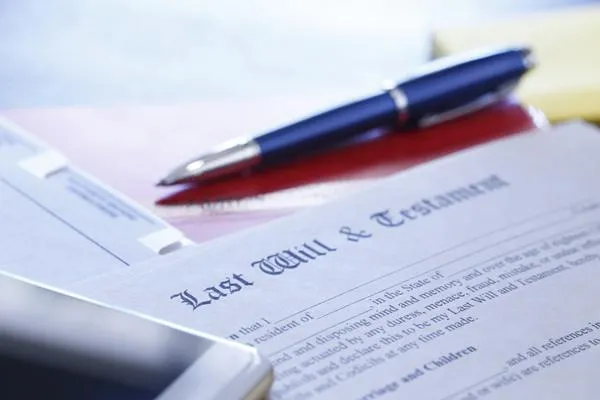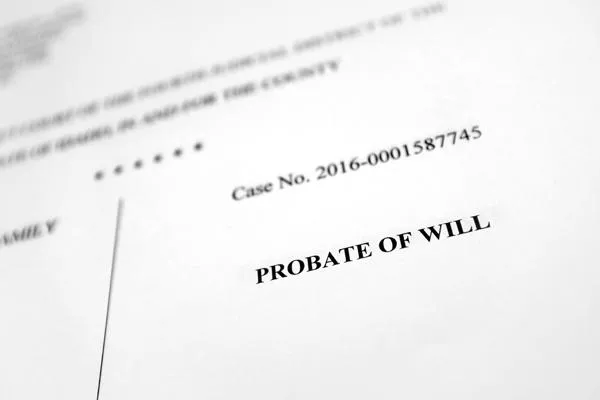Probate is the process of managing debts and assets of an estate after someone has passed away. When someone dies (the legal term is decedent), estate law is enacted to ensure the orderly discharge of that person's final debts and transferring any remaining assets to his or her legal heirs. In the case of a will, probate follows the instructions in the will. However, probate for any property not covered in a will is managed by the court following the instructions in Texas statutes.
The probate process includes settling accounts that the decedent owed money on or was owed money by. The process also includes finding and collecting all properties that were owned by the decedent. Finally, the heirs of the deceased must be identified and located and the assets distributed according to the law and any legal instruments the decedent left behind for their transfer.
Wills and Probate Law

The probate process is significantly simplified when a legal will and other financial, health, and legal estate planning documents are in order before the decedent's passing. Even with proper estate planning, there is still a probate process as the probate court issues letters testamentary and ensures that the will is executed properly and appoints required guardianships of the person or the estate.
In other words, even if the deceased has all his or her estate planning documents in place, the courts will still play an instrumental part in enforcing the plan and dealing with any areas not covered in the estate planning.
Marshaling Property
Part of the probate process is marshaling the property of the decedent. Collecting the properties, persons, debts, liens, and other information for executing the estate is a major part of the probate process.
There are certain documents that will supersede a will and keep property out of the probate process. T.O.D and P.O.D. (Transfer or Pay on Death) clauses are often found in insurance policies, bank accounts, trusts, and other documents. Further, the Texas State Legislature has codified a Revocable Transfer on Death Deed as a significant instrument for transferring properties outside the probate process.
Settling Debtors and Creditors
Settling accounts is a key part of the probate process. During the collection of property, the executor will need to identify any people who owe the deceased money and make arrangements for payment of those debts to the estate. The executor will also identify any creditors who are owed money by the estate and pay them.
Distributing the Net Estate
After all the accounts are settled, the probate court and estate executors will distribute the leftover net estate. This includes selling real properties and dividing the assets among the heirs according to the will or according to the process determined by the court.
Special Situations When No Will Is Present
When no will is present, the probate court will assign an administrator of the estate through letters of administration. The process will include the same steps as executing a will including marshaling of property, settling debtors and creditors and distributing net assets. However, when there is no will present, the court will also determine heirship, those who have rights to the deceased's estate.
Smaller Estates
For smaller estates that do not have a will, heirs of the decedent can use an affidavit of heirship or a small estate affidavit to avoid the probate process. An affidavit of heirship is one possibility for managing an estate that was composed of real estate and had no debts besides those secured by real estate. A small estate affidavit is for estates with less than $75,000 in assets, and must be filed by an heir at least 30 days after the day of passing.
Affidavit of Heirship
An affidavit of heirship is not a formal part of a probate process. It is filed in the public records of the counties where there are properties that were owned by the deceased. The affidavit of heirship documents the family relationships of the deceased and is held on file to demonstrate who all the heirs of the decedent are.
Affidavits of heirship are not considered prima facie evidence of heirship until they have been on record for at least 5 years. They also do not have any determinative power over who the heirs are for the estate. Since the affidavit of heirship is not legally executed, many banks and title companies will not accept an affidavit of heirship as proof of the right to inherit.
An affidavit of heirship is not the best for all situations, but in simpler estate situations, it can be an effective method for managing an estate without a will.
Small Estate Affidavit
Designed for estates with less than $75,000 in assets, the small estate affidavit is approved in probate court in the county the deceased lived in at the time of death. Because it is approved by a probate court, the small estate affidavit is accepted by banks and other businesses for dealing with the heirs within the affidavit.
The small estate affidavit must be filed at least 30 days after the decedent's death and the person filing the affidavit must be an heir with entitlement to the estate. There also must be no other probate proceedings at court.
Unless the estate fits under one of the two items mentioned above, the probate process for estates without a will or where a substantial amount of property not covered by the will is as follows.
Determination of Heirship

Determining heirs is essential for executing an estate without a will through the probate court. This process seeks to address the known heirs as well as find unknown heirs. An intestate (no will) process is required by Texas state law to divide the assets and property according to blood and marriage relationships.
Unknown and known heirs will be made party to the probate suit and the probate court may appoint an attorney ad litem who represents the interests of unknown heirs.
In addition to unknown heirs, you need to determine whether the property is community property. If there are no children from previous partners, all property is considered community property and is transferred to the surviving spouse, unless there are assets that are proven to be separate property. Proving separate property is difficult to do unless the financial property is clearly separate from the other spouse, as in the case of inheritances and gifts, property that the spouse had from before the marriage, certain settlements, and finances attached to the separate properties.
Representation
Probate matters require a licensed attorney. Only a licensed attorney may represent someone applying for letters of administration, guardianship, and other estate-related issues. You may represent yourself in matters of estate law as long as you can demonstrate that you are only representing yourself.
An estate lawyer specializes in helping all parties navigate the emotionally difficult process of probate. While any licensed attorney may fill the paperwork out and represent the heirs in probate, an estate attorney will know how to understand Texas Estate Laws and have a better understanding of the costs of going through probate, for example, we offer flat rate fees for many probate cases.
Witnesses and Heirs
To demonstrate proof of heirship, probate court prefers to use the testimony of two disinterested witnesses, those who will not inherit anything from the estate. Often both heirs and witnesses will appear at court in person, but the Texas legislature has defined how to provide written deposition in the case that a party involved in probate cannot come to the court in person.
Written Deposition
The Texas Rules of Civil Procedure govern how written depositions are to be taken for representation within the probate court without being present. Key items to note on supplying written depositions to the probate court include the need to give your testimony in front of an authorized party where you are, the need for timely notifications regarding the testimony, and the testimony must be taken under oath.
Letters of Administration
When someone dies without a proper will, the probate court will appoint an executor of the estate through issuing letters of administration. This person is tasked with the responsibility of finding heirs, if necessary, and working through the collection of assets and distribution of them to creditors and then to heirs.
The administrator functions similar to an executor of a will but answers to the probate court in lieu of a will. If you have a proper will, then the probate court works to enact it as much as is possible. Without one, the court will enact the equitable distribution of the estate's assets to all legal heirs.
Learn More About Texas Probate
For more in-depth reading on estate law, The Texas Estate Code covers all laws regarding estates and the assets and persons left behind when someone dies. There are over 100 chapters in the Texas Estate Code.
If you are looking for more information on specific issues regarding setting up an estate plan, dealing with probate court, or other issues related to the death of a loved one, please contact our experienced probate lawyer today.
For more information please request a copy of our Legal Services Schedule (PDF format).
![]()